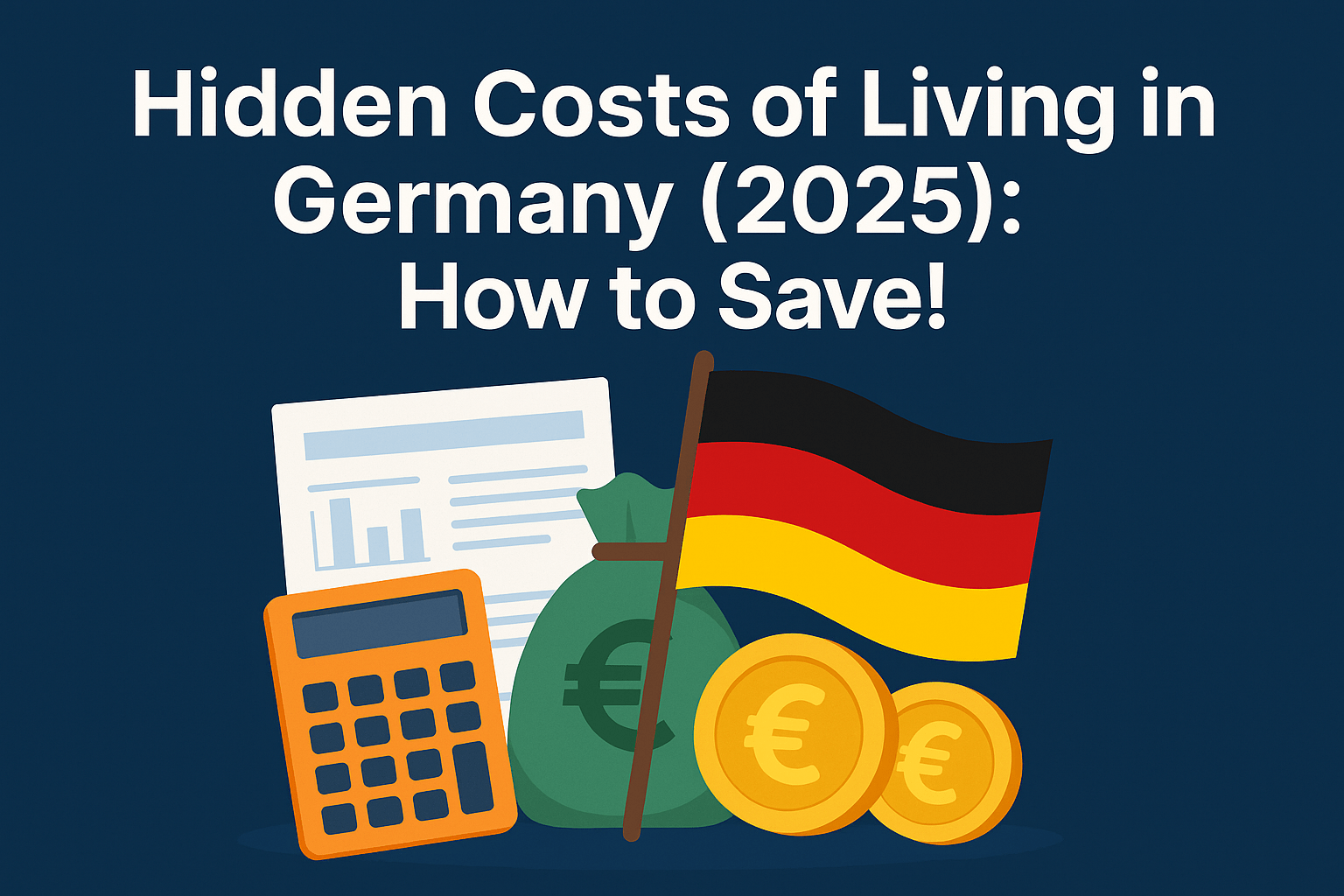Thinking about moving to Germany for studies, work, or a fresh start?
While Germany is known for its free education and excellent quality of life, many newcomers are surprised by the hidden living expenses they face.
This guide uncovers all the real costs — and shows you smart ways to save big!
🎯 Why You Need to Know About Hidden Costs
At first glance, Germany seems affordable:
- No tuition fees at public universities 🎓
- Low healthcare costs compared to the US 🇩🇪
- Efficient public transport 🚉
But beneath the surface, expenses add up quickly:
Rent deposits, insurance premiums, semester fees, daily groceries, and unexpected bureaucracy costs can easily surprise newcomers.
Understanding these hidden costs early can save you thousands of euros during your stay!
💸 Main Hidden Costs You Must Plan For
1. 🏠 Rent and Deposits
- Monthly Rent: €300 – €800 (depending on city and apartment type)
- Deposit: Usually 3 months’ rent upfront (can be €1,500+)
Tip to Save:
– Look for WG (Wohngemeinschaft — shared apartments). Sites like WG-Gesucht.de offer cheaper options for students and young professionals.
2. 🏥 Health Insurance
- Students: Public health insurance ~ €120 per month
- Employees: Contribution from your salary (~14–15%)
Tip to Save:
– If you’re a student under 30 years old, get discounted public health insurance (like TK, AOK).
3. 🎓 Semester Contributions
- Even in tuition-free universities, you must pay a semester fee:
- Typically €150 – €350 every 6 months
- Covers public transport, student services
Tip to Save:
– Use the free public transport card included — it saves hundreds monthly!
4. 🍞 Daily Living Expenses
- Groceries: €200 – €300 per month
- Dining out: Even a cheap meal costs €8–€15
- Internet/Phone: €25–€40 per month
Tip to Save:
– Shop at discount supermarkets like Aldi, Lidl, and Penny. Cook meals at home instead of eating out frequently.
5. 📝 Bureaucratic Fees
- City Registration (Anmeldung): Free but fines for late registration
- Visa Extension/Residence Permit Fees: ~€100
- Blocked Account Setup: ~€50–€150 setup fee
Tip to Save:
– Prepare documents carefully to avoid multiple appointments or penalties.
6. 🚲 Transportation
- Public Transport Pass: €30–€70 per month (outside semester ticket deals)
- Bicycle: Buying a used bike can be cheaper than monthly transport passes.
Tip to Save:
– In student cities like Leipzig or Jena, a bike is the smartest transport investment.
🧠 Common Mistakes That Cost Students and Newcomers More
- Underestimating housing costs (especially in Munich, Frankfurt, Hamburg)
- Not budgeting for insurance and registration fees
- Depending only on card payments — many German shops still prefer cash!
📈 Average Monthly Budget for Students (2025)
| Expense | Cost (in €) |
|---|---|
| Rent (shared flat) | 400 |
| Groceries | 250 |
| Health Insurance | 120 |
| Phone + Internet | 35 |
| Leisure/Transport | 100 |
| Miscellaneous | 100 |
| Total Estimate | 1,005 € / month |
🚀 How to Save Big (Smart Strategies)
| Strategy | Tip |
|---|---|
| Find flatshares early | Avoid peak moving seasons (August–September) |
| Apply for scholarships | Even non-tuition grants help with living expenses |
| Use student discounts | Trains, museums, fitness centers offer major deals |
| Work part-time | Students allowed 120 full or 240 half days per year |
| Buy second-hand | Furniture, bikes, clothes from eBay Kleinanzeigen |
❓ FAQs About Living Costs in Germany
Is €900 enough to live as a student in Germany?
➡️ Barely. Only in smaller cities. Bigger cities like Munich easily demand €1,200/month.
Is food expensive in Germany?
➡️ Groceries are affordable compared to the UK/USA, but eating out often is costly.
Can I work while studying to support my expenses?
➡️ Yes! Most student visas allow 20 hours per week during semester and full-time during breaks.
Which cities are cheapest for students?
➡️ Leipzig, Dresden, Jena, Saarbrücken are considered affordable cities.
✨ Final Thoughts: Prepare Smart, Live Free!
Germany offers incredible opportunities — if you plan well.
By understanding the hidden costs upfront, budgeting realistically, and using every saving trick available, you can enjoy your stay without financial stress.
Dream big — but plan smarter. 🇩🇪
Also check out: Is Education Really Free in Germany?







Leave a Reply